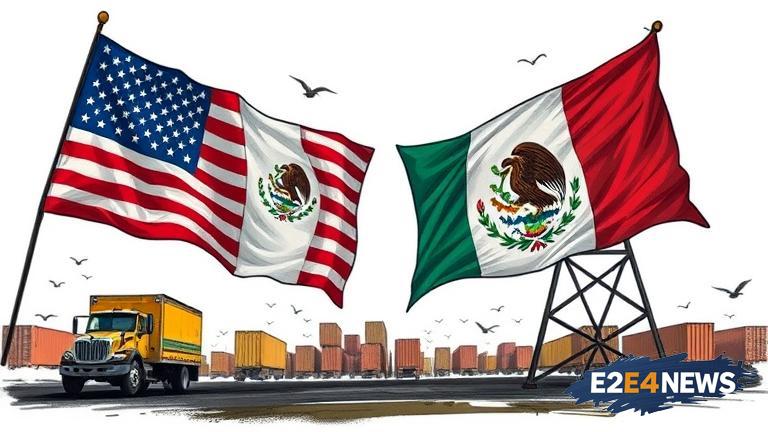The United States and Mexico are on the brink of a major trade war, with the US threatening to impose tariffs on Mexican goods if a deal is not reached by the deadline. The tariffs, which are set to take effect on June 10, would impose a 5% tax on all Mexican goods imported into the US. This move is expected to have a significant impact on the Mexican economy, as the US is one of Mexico’s largest trading partners. The tariffs are being imposed in response to Mexico’s perceived failure to stem the flow of migrants crossing the US-Mexico border. The US has been pressuring Mexico to take greater action to prevent migrants from reaching the US, and has threatened to impose increasingly severe tariffs if Mexico does not comply. Mexican Foreign Minister Marcelo Ebrard has been in Washington, DC, negotiating with US officials in an attempt to reach a deal. Ebrard has stated that Mexico is willing to work with the US to address the issue of migration, but has rejected the idea of imposing tariffs. The Mexican government has also announced plans to send thousands of National Guard troops to the US-Mexico border in an effort to stem the flow of migrants. Despite these efforts, the US has indicated that it is unlikely to back down on its threat to impose tariffs. The tariffs would have a significant impact on the US economy as well, as many American companies rely on Mexican goods and would be forced to pay the increased tax. The US Chamber of Commerce has estimated that the tariffs could cost American businesses up to $3 billion per month. The trade dispute has also sparked concerns about the potential impact on the global economy. The International Monetary Fund has warned that a trade war between the US and Mexico could have far-reaching consequences, including a decline in economic growth and an increase in unemployment. The US and Mexico have a long history of trade cooperation, and the imposition of tariffs would mark a significant shift in their relationship. The two countries have been working together to implement the US-Mexico-Canada Agreement (USMCA), a trade deal that is intended to replace the North American Free Trade Agreement (NAFTA). However, the trade dispute has put the implementation of the USMCA in jeopardy. The Mexican government has stated that it will not ratify the USMCA if the tariffs are imposed. The US has also been pressuring Mexico to take greater action to address the issue of trade, including the implementation of stricter labor and environmental standards. The Mexican government has agreed to work with the US on these issues, but has rejected the idea of imposing tariffs. The trade dispute has sparked widespread criticism, with many arguing that the tariffs would be counterproductive and would ultimately harm the US economy. The US Congress has also expressed opposition to the tariffs, with many lawmakers arguing that they would be a mistake. Despite the opposition, the US has indicated that it is unlikely to back down on its threat to impose tariffs. The deadline for the tariffs is rapidly approaching, and it remains to be seen whether the US and Mexico will be able to reach a deal. The outcome of the trade dispute will have significant implications for the global economy, and will be closely watched by investors and policymakers around the world.
